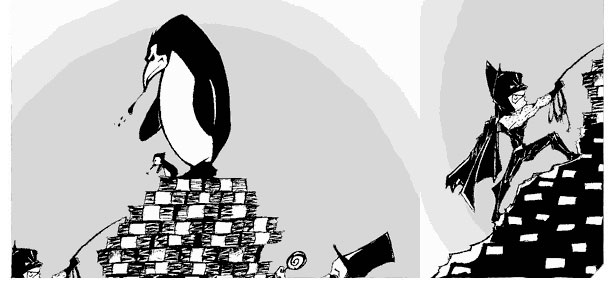
by Maria Lewis
Every summer, movie theatres are flooded with a series of blockbuster hopefuls, each one striving to break new records for ticket sales and millions grossed. This summer was no exception. The steamy months from Memorial Day to Labor Day saw the release of films such as War of the Worlds, The Dukes of Hazzard, The Fantastic Four , and The Island . A few, such as War of the Worlds , were modestly successful.
But most, including The Island, The Dukes of Hazzard , and The Fantastic Four , were expensive flops. Even with extensive marketing campaigns, glittering star power, and lots of explosions and shiny objects, movies that seemingly fit the Hollywood formula for success fizzled without much fanfare. Indeed, in a summer where the sleeper hit is March of the Penguins , one has to wonder if the public’s taste in entertainment is changing.
Or maybe it’s just that these days, movies are terrible. That seems to be the conclusion of a recent survey from research company Brandimensions, which launched a study to unearth the causes behind recent box office slumps. This year, box office take is 8% lower than it was last year, and ticket sales are down 11%. Entertainment industry officials were keen to know why.
Brandimensions’ survey encompasses a multitude of online sources, and includes input from over 1.9 million Internet blogs and chat rooms. A number of reasons were cited for not going to the movies, but the leader by far was movie quality itself. Many sources stated that they would be happy to deal with other inconveniences- rising costs and onscreen commercials for example- if the movie itself was worthwhile. Other reasons cited were availability of entertainment online and DVDs.
Some recent reviews seem to support the survey’s claim. Daily newspaper Red Eye , which is affiliated with the Chicago Tribune , described the recent release of Transporter 2 as an “abomination of human endeavor,” citing that it defied the laws of physics to the point of absurdity.
So what does this portend for the future of the entertainment industry? Are we, as a public, becoming smarter and more invested in plot-driven entertainment? Or are we simply so glutted with media already that we are just harder to please? With only a preliminary study to shed any light on this issue, it’s hard to say.
Brandimensions’ survey is hardly comprehensive. It focuses strongly on the online and technology-savvy community. The survey reports that the demographic least likely to go to the movies is males age 25-49, followed by females of the same age group. However, it is unclear whether or not this is an accurate portrayal, or simply reflects a bias in the survey methods. After all, not many 65-year-olds keep a blog.
Barbara Scharres, Director of Programming at the Gene Siskel Film Center, offers some words of caution about the survey, stating, “Take into consideration that those articles appeared in Hollywood trade journals,” and that they reference, “the latest product from Hollywood.” Scharres maintains that there is still a “wealth of really wonderful things to choose from,” and that they are not as hard to find as many people think.
Still, Scharres has also felt the impact of declining ticket sales. She agrees that there has been a nationwide trend away from theatre attendance, and that its effects can be felt even in the independent film industry. This would suggest that this trend isn’t solely the product of movie quality, a view that Scharres agrees with. “The trend has a lot to do with the changes in the way people consume movies,” she says, citing such alternatives as DVDs, downloadable media, and the Internet. “The Internet itself is a tremendous entertainment option.”
It is certainly true that the Internet has dramatically shifted the way we view entertainment. Movies are now available almost instantly after their release, both as illegal downloads and DVDs. Netflix has made renting movies nearly obsolete, offering a DVD by mail service with no late fees. Blockbuster video, once a booming chain, is struggling to stay competitive.
Other media, too, have felt the effects of the Internet. For example, iPods and the accompanying iTunes online music store have made music consumption instantaneous and continuous. The album is becoming a thing of the past, with some musicians releasing small, consumable bundles of songs instead of longer collections.
Whether or not Brandimensions’ survey is accurate in its conclusions, it does seem to highlight one truth. Entertainment as we know it is changing. Movie quality might be one factor in this movement, but undoubtedly there are a multitude of forces a work. The way we consume and produce entertainment is changing, and media that fail to accommodate these changing demands will likely fall behind. And for the moment at least, that is the challenge facing mainstream Hollywood filmmaking.
Illustration by Elgin Smith
October 2005





